Balanced diets are crucial for overall health. Especially during pregnancy, and postpartum, for the new mother and the child, balanced diets are sources of wholesome nutrition.
In an interview with HT Lifestyle, Dt. Vinotha. M, clinical dietitian, Apollo Cradle and Children’s Hospitals, Chennai- Karapakkam said, ” Having a well-balanced diet during pregnancy and childhood promotes stronger bodies, sharper brains, and healthier futures.” Surgeon shares 10 tips to boost metabolism in your 30s: Add more protein and spices to diet
The dietitian further shared a few tips to follow:
1. Prioritise whole foods
Fresh fruits, vegetables, whole grains, pulses, nuts, and seeds are rich in natural antioxidants and provide the body with essential nutrients necessary for its repair and maintenance. Prioritising whole foods over processed foods is a very simple way of making diets healthier.
2. Provide sufficient protein
Protein is a key macronutrient essential in building and repairing tissue; however, it is also among the most commonly ignored nutrients in Indian diets. Include a variety of protein sources as per dietary preferences, such as eggs, milk, and plant sources such as tofu, beans, legumes, etc, to meet daily requirements.
3. Emphasise iron
Include iron-rich foods like leafy greens, iron-fortified cereals, and lean red meat. Pairing these with vitamin C-rich foods, such as citrus fruits, helps improve iron absorption.
4. Calcium
Calcium is essential for skeletal health. Ensure daily consumption of milk, yoghurt, cheese, or supplement calcium if needs aren’t met.
5. Add healthy fats
Healthy fats present in walnuts, flaxseed, and fatty fish omega-3s support brain and eye development. They also support stable energy and fight inflammation.
 6. Stay hydrated
6. Stay hydrated
Water aids the body in digesting food, transporting nutrients, and sustaining energy. Pregnant women should increase fluid intake by drinking more water, and if that isn’t feasible, then other sources like homemade juices, soups, herbal teas, etc. Children should be encouraged to prefer water over sugary beverages.
7. Reduce sugar and salt
Excessive sugar can damage teeth and lead to excess weight gain, whereas excess salt increases future high blood pressure levels. Substitute processed foods with fruits, dry fruits, or healthy snacks.
8. Eat small, frequent meals
Eating small, frequent meals can help manage nausea and also help prevent fatigue. It can help with cravings and minimize binge eating.
9. Food safety
Pregnant women should avoid eating raw or partially cooked meat. They should eat food that has been freshly cooked and correctly stored to avoid any infections.
10. Introduce variety
A plate full of colours with different fruits and vegetables assures different nutrient sources while also stimulating children to increase the excitement surrounding food.
